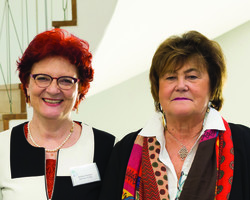Joint statement: European Immunization Week

ECDC
Dr Zsuzsanna Jakab, Regional Director, WHO Regional Office for Europe
Dr Andrea Ammon, Director, European Centre for Disease Prevention and Control
Copenhagen, Stockholm, 24 April 2019
Vaccines have transformed our societies. They have increased the chances for each newborn to reach adulthood, and for each fully vaccinated adult to maintain good health and well-being, thereby contributing enormously to productivity in every country.
In many countries in the WHO European Region, vaccination coverage and the number of diseases targeted by vaccines continue to steadily increase. This is a tremendous achievement and a cost-effective investment in a future free of vaccine-preventable diseases.
European Immunization Week 2019 celebrates this ongoing progress and the many vaccine heroes – from scientists to health workers, policy-makers to parents, and everyone in between – who make it possible.
At the same time, we cannot ignore the children and adults who are not yet protected. Contagious diseases do not respect national borders, and efforts to control them cannot stop there either. The measles virus continued to spread across the Region in 2018, including in countries of the European Union, causing over 80 000 infections and over 70 deaths. Unfortunately, data for the first months of 2019 demonstrate that this spread continues.
Joint resolve and individual action across Europe
Progress towards universal health coverage and, ultimately, Goal 3 of the Sustainable Development Goals – ensuring healthy lives and promoting well-being for all at all ages – are priorities in Europe.
Eliminating measles and rubella, and protecting children and adults from other vaccine-preventable diseases, are an intrinsic part of achieving these goals. This requires collective action and accountability to ensure high immunization coverage for all.
Together with Member States, WHO and the European Union have taken bold steps to address the immunization gaps that offer an open door to any vaccine-preventable disease. The activities set in motion by the WHO European Vaccine Action Plan, the Council Recommendation on strengthened cooperation against vaccine-preventable diseases, and the European Union’s Joint Action on Vaccination have far-reaching consequences for health systems and communities. Our joint resolve to increase immunization coverage must be felt in every community and health facility throughout the Region.
At the same time, more work, and more vaccine heroes, are needed to spread the message that vaccines work. European Immunization Week is an important opportunity to raise awareness about vaccines among decision-makers both in families and in governments, and to thereby help sustain high access to and demand for immunization services.
By being informed and sharing the facts about immunization, each person can play a key role in ensuring protection for all and be a vaccine hero.



